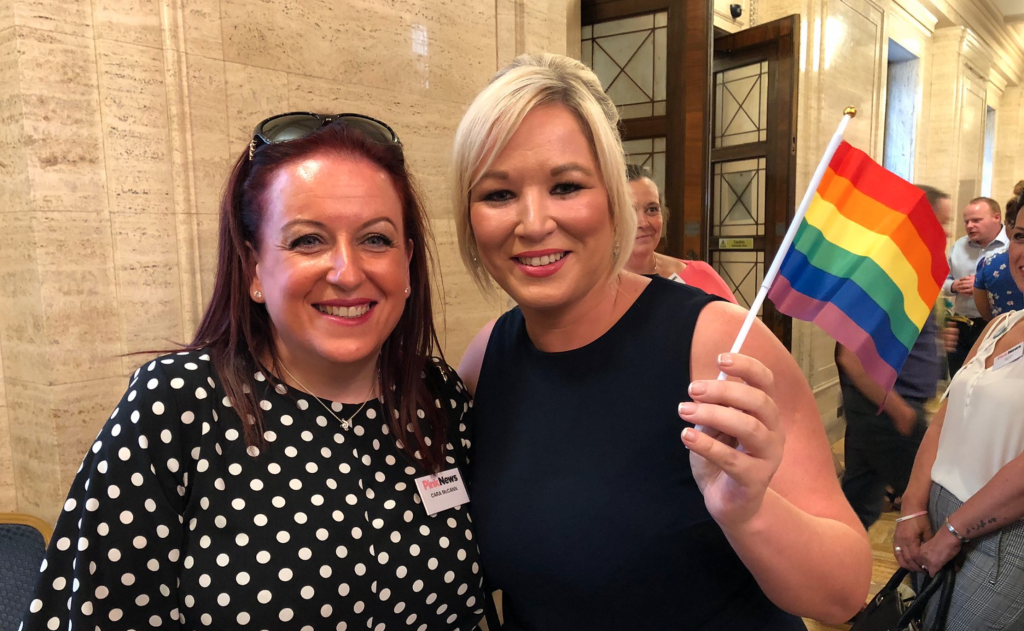

What the evolution of Sinn Féin nationalism reveals about the contemporary “crisis” of liberalism
Sinn Féin. This Irish language phrase has served to name the Irish nationalist party that led the break from Great Britain following the failed Easter Rising of 1916. Translated as “Ourselves, Alone,” this phrase suggests a strong, almost tribal, sense of the Irish as a distinct people. Translated as “We, Ourselves,” it suggests a blander vision of Ireland as merely a distinct political sovereignty. Reflecting an ambiguity common to modern nationalisms, Irish Catholic nationalism has affirmed both visions. But historically Sinn Féin would come to bear the burden of defending this nationalism within the hostile country of Northern Ireland, the Protestant-dominated statelet that remained part of the United Kingdom after the Catholic south achieved independence. This defense often turned violent. During the period known as “The Troubles” (roughly 1968-1998), Sinn Féin refused to denounce the violence of the nationalist, paramilitary Irish Republican Army (IRA), and indeed was commonly described as the “political wing of the IRA.”
All this ancient Irish history has become a news story once again. In the most recent Northern Ireland Assembly election, Sinn Féin won a majority of seats. A plurality rather than an absolute majority, this electoral achievement is still a watershed moment in Irish and British history. It is also yet another sign of how that history is so often out of step with the rest of Europe, and how the term Sinn Féin is so appropriate to Irish nationalism. Given the party’s roots in nineteenth-century Irish Catholic nationalism and twentieth-century paramilitary violence, one might think Sinn Féin’s victory yet another instance of the atavistic, xenophobic and vaguely Christian nationalism associated with Viktor Orbán in Hungary. Nothing could be further from the truth.
Michele O’Neill, head of Sinn Féin in Northern Ireland, declared the victory “a very significant moment of change . . . a defining moment in our politics and for our people.” What definition did she attach to this moment? A united Ireland? A Catholic Ireland? A Nation Once Again? No. Despite some nod to “honest debate” about the relation between Northern Ireland and the Republic in the south, her vision is fundamentally domestic: “Today ushers in a new era which I believe presents us all with an opportunity to reimagine relationships in this society on the basis of fairness, on the basis of equality and on the basis of social justice.” In most mainstream news accounts, one has to scroll down several paragraphs into the story even to find the words “Catholic” and “Protestant.”
The most significant nationalism at play in the elections may in fact have been the British nationalism of Brexit. Many Protestants of Northern Ireland—so-called Unionists for their desire to remain part of the United Kingdom—supported Brexit, for they feared that increasing ties with the European Union were undermining the traditional British political identity, an identity that defined them against the separate Catholic state which emerged to the south during the 1920s. Others, however, have recognized the economic advantages that come from ties to Europe and the most proximate representative of the European Union (EU), the Irish Republic.
Since the ceasefire of the so-called “Good Friday Agreement” (signed on April 10, the Friday before Easter, 1998), leaders of both communities have hoped that economic development would help to smooth over sectarian strife. The Troubles took place in the context of the general de-industrialization of Western economies. Northern Ireland had been home to the only real industry on the island, primarily in linen and shipbuilding. Protestants clung to traditional hiring privileges in a shrinking pool of jobs, all the while facing increasing pressure for fair access from a growing Catholic population. Twenty years later the tables were turned. The formerly impoverished Republic, whose major export had been its own people, transformed itself into the “Celtic Tiger,” a tech and finance hub for American companies seeking tax breaks and an educated, English-speaking workforce with which to access the European market. Sectarian politics notwithstanding, the North wanted a piece of the action.
Brexit threatened the open border between the North and the Republic. The EU insisted on its authority to monitor the movement of goods, particular food and animal products in and out of the Eurozone. The price for open borders within the island of Ireland has been a hard border between Northern Ireland and mainland Britain (separated geographically by the Irish Sea). The resulting supply chain issues and price increases have divided Unionists between those who accept severing economic ties with the Republic as the price of Brexit and those who wish to seek some compromise with the EU. Pro-EU Sinn Féin’s electoral victory reflects in part these divisions within the Unionist community.
American news reports on the election invariably contain some teaser headlines about the future prospects for a united Ireland, but more reflective commentary has noted the dominance of economic over nationalist concerns in Sinn Féin’s victory rhetoric. O’Neill’s vision of a “new era” appears indistinguishable from the by-now-old era of European social democracy. There is much to admire in that model, but nothing that is distinctly Irish. From the mainstream, modern Western liberal vision of politics, this is all to the good.
In the early twentieth century, the great German sociologist Max Weber distinguished between a politics of “interests” (material and technical concerns, divisible, negotiable, non-absolute) and a politics of “status” (cultural and religious ideals, indivisible, non-negotiable, absolute) and judged that “politics as a vocation” confine itself to the former. In the wake of fascism and the continued threat of communism, mid-century American intellectuals such as Richard Hofstadter and Daniel Bell drew on Weber to construct the managerial-technocratic vision of politics that continues to shape mainstream liberalism. From this perspective, the alternative is hatred, violence, fascism: whether from an IRA gunman or the MAGA hordes of January 6th. Liberalism is the only rational alternative, the last best hope of mankind.
The most stinging rebuke to this conceit comes from a source that does not have much insightful to say about any other topic: Benito Mussolini, the founder of Italian fascism. In response to liberal outrage at the fascist glorification of violence, Mussolini held up this mirror to bourgeois modernity,
The “Liberal” century, after having accumulated an infinity of Gordian knots, tried to untie them by the hecatomb of the World War. Never before has any religion imposed such a cruel sacrifice. Were the gods of Liberalism thirsty for blood?
The Irish Nationalism of pre-1998 Sinn Féin was in part a legacy of the broader “liberal” nationalism that drove Europe to the killing fields of the Great War. Still, the “terrorism” of “The Troubles” appears sane and rational compared with the violence of state actors in that “legitimate” war.
Sinn Féin’s renunciation of violence and subsequent electoral success following the “Good Friday Agreement” should not serve as proof that liberalism is somehow uniquely constituted to save humanity from its sins. Modern liberalism no longer builds altars to the gods of nationalism; it may even plausibly deny guilt for past sins on the grounds that nationalist invocations of “blood and soil” were always inherently unliberal. Still, it has found other equally bloodthirsty gods to worship. The taming of Irish nationalism and further integration into European Union-style liberalism has drawn the Irish—Catholic and Protestant alike—more fully into a political modernity that affirms abortion as a fundamental human right. Until very recently, the Republic of Ireland and Northern Ireland had both been abortion outliers within Europe: on this issue, they were in effect “themselves, alone.” Today, defenders of abortion perform their child-sacrifice to appease the undeniably liberal gods of freedom and choice. There is no plausible deniability anymore. Post-nationalist liberalism may have renounced the rites of war, but not the need for blood.
Christopher Shannon is associate professor of history at Christendom College in Front Royal, Virginia. He is the author of several works on U.S. cultural history and American Catholic history, including the forthcoming American Pilgrimage: A Historical Journey Through Catholic Life in a New World, due this spring from Ignatius Press.